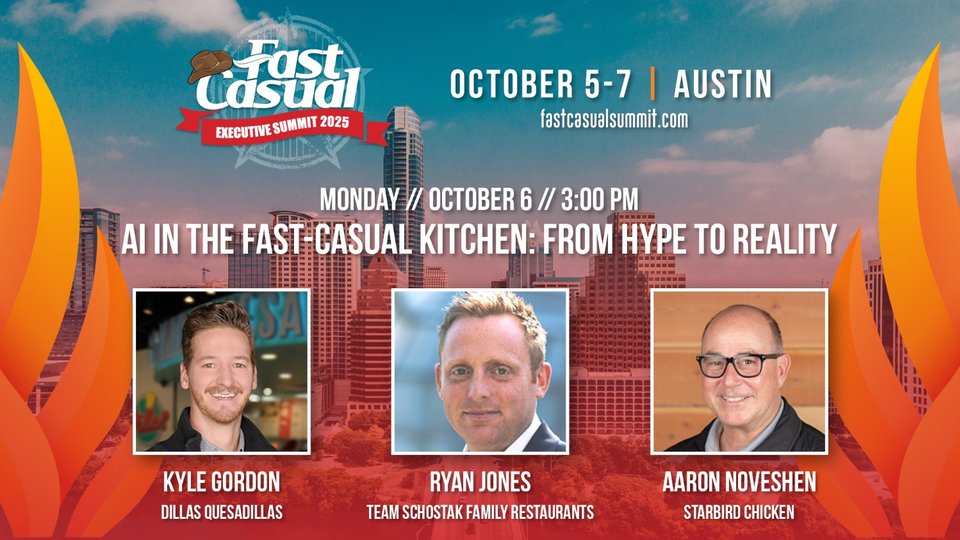Technology
Two of this year’s Fast Casual Executive Summit panelists, Aaron Noveshen, founder and CEO of Starbird Chicken, and Kyle Gordon, co-founder and CEO of Dillas Quesadillas, offer a behind-the-scenes look at how AI is already transforming their kitchens, teams and guest experiences.

Photo: Networld Media Group
July 25, 2025 by Sandra Carpenter — Editor, Networld Media Group
The future of fast casual dining is undeniably powered by artificial intelligence, and as the industry gears up for this year’s Fast Casual Executive Summit, a closer look at AI’s real-world impact feels especially timely.
The Summit, Oct. 5 to 7, 2025, in Austin, Texas, has long been the go-to event for top restaurant leaders. With a focus on innovation, collaboration and practical strategy, the summit brings together decision-makers who are shaping the future of foodservice.
One standout session, “AI in the Fast-Casual Kitchen: From Hype to Reality,” scheduled for Oct. 6, will shine a spotlight on how operators are turning AI from a buzzword into a business advantage. Two of the panelists, Aaron Noveshen, founder and CEO of Starbird Chicken, and Kyle Gordon, co-founder and CEO of Dillas Quesadillas, gave us a preview of the AIinsights they’ll be sharing on stage.
AI’s immediate impact in the kitchen
“We’re using QSR Automations’ AI-powered forecasts to better predict demand,” Noveshen said. “That has led to improved food quality, prep accuracy, and reduced waste.” The ability to prepare the right amount of food at the right time not only reduces spoilage, it also ensures a better experience for guests.
AI is also playing a role in easing pressure during busy shifts.
“We’re piloting Curbit’s AI-driven capacity management to optimize order flow during peak hours. Early signs show shorter lead times and more efficient kitchen pacing,” Noveshen said.
Onboarding is another area seeing major gains. Noveshen highlighted how Opus uses AI to quickly generate and translate training content, helping new hires ramp up faster and lightening the load on internal teams.
At Dillas Quesadillas, Gordon shared how it’s AI Prep Assistant brought unexpected wins.
“We were just hoping to reduce waste and food cost,” he said. “But the hidden impact has been labor allocation. Since our prep needs are now so accurate and efficient, we can shift two extra hours per day to customer-facing positions. It also gets the Leader on Duty back in service instead of stuck in the back of house.”
He added that AI support during prep has also helped speed up the onboarding of new shift leaders, cutting weeks off the learning curve.
Where AI is headed next
Looking to the next three to five years, Noveshen and Gordon both see huge opportunities on the horizon.
Noveshen envisions smarter guest engagement powered by AI ordering assistants. These tools would be connected to CRM and support platforms to understand guest history, preferences and even tone, enabling more personal and effective service. He also pointed to robotics as a game-changer, with humanoid robots supporting kitchen and front-of-house tasks, and autonomous delivery solutions rethinking last-mile logistics.
Another major opportunity is what he called “AI Coaching for Operators.” With general managers juggling data from dozens of systems, AI could act as a strategic copilot, surfacing insights, flagging issues and even taking action to improve performance.
Gordon sees the next wave of AI as something that makes every general manager stronger and more confident.
“I don’t believe it’s come to market yet, but it will be the AI product that helps turn average GMs into super GMs through integration and analytics,” he said.
He described a future where a fully integrated tech stack is paired with a smart internal chat that provides operational insight on demand. For example, a GM could ask why sales dipped the previous day, get coaching on a personnel issue aligned with the company handbook, or receive a guided review of the P&L with systemwide benchmarks.
Lessons learned on the path to integration
Of course, integrating AI doesn’t come without challenges. Noveshen was candid about the limitations of siloed systems.
“We’ve embedded AI into many platforms, but each operates in isolation,” he said. “None have a holistic understanding of the business or share a common data context.” His takeaway? It is important to keep testing new tools, but just as important to pause when needed and wait for integrated, context-aware systems that reduce complexity rather than add to it.
For Gordon, the biggest hurdle was building trust.
“AI starts as a child and must be trained, so it makes mistakes,” he said.
Those early missteps created skepticism among team members. But as the prep assistant improved and proved itself through more accurate forecasting, it earned buy-in from the team.
“Now it’s a reliable extension of our team and is looked at as adding value, not just checking a box,” Godon said
Both leaders agree that AI’s potential is vast, but its value lies in thoughtful implementation and a clear understanding of the restaurant’s goals.
As Noveshen and Gordon prepare to share more during the upcoming Fast Casual Executive Summit, their experience serves as a reminder that the future of foodservice is not just high-tech; it’s high-impact.
Don’t miss this essential conversation and many others at the Fast Casual Executive Summit. Learn more and register at https://fastcasualsummit.com/register.


